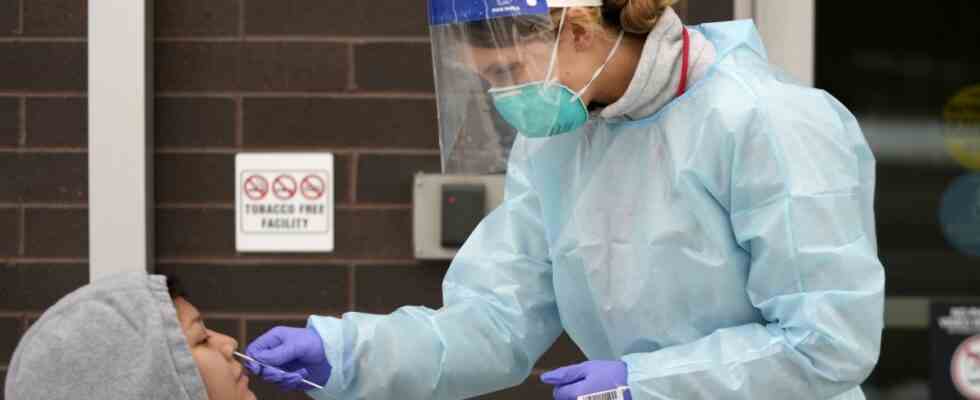The Sars-CoV-2 coronavirus keeps causing surprises, this time at Christmas time: the omicron variant XBB 1.5, which arose from the XBB variant, is spreading in the USA. The US health authority CDC assumes that around 40 percent of all new infections in the USA can be attributed to XBB 1.5.
According to genetic analyzes by a team led by microbiologist Tomokazu Tamura from Osaka University, the XBB variant could have arisen in India in the summer of 2022 through the recombination of two BA.2 subvariants, as found in one on the preprint server Biorxiv write published study, which has not yet been assessed by independent experts. Recombination can occur when a person is infected with two different strains of the virus at the same time. During the copying process of the virus genome in an infected cell, genetic material fragments of both viruses can then be mixed up. It stands to reason that these changes in the genome lead to XBB and XBB 1.5. In comparison to its predecessors and other circulating variants, it is somewhat better at escaping the body’s first anti-body defences. This is reported by an journal Cell published study examining antibody neutralizations in XBB.
So far there is no indication that the new variant leads to more severe courses
XBB.1.5, in turn, evolved from XBB by mutation in the virus’ spike protein. With the spike protein, the virus docks onto the ACE-2 receptors of the human mucous membrane cells, ultimately triggering the infection. XBB 1.5 has probably trumped XBB: “It looks like XBB 1.5 has managed to increase its binding affinity to ACE-2 on an immune-vasive background,” says Richard Neher, head of the research group “Evolution of Viruses and Bacteria” at the Biozentrum der University of Basel.
That’s scientifically interesting, but it’s not cause for excitement: So far, there has been no evidence that XBB 1.5. compared to other omicron variants, leads to more severe disease progression, says Richard Neher. Ralf Bartenschlager, virologist at the University of Heidelberg and President of the German Society for Virology, also sees it this way: “It is and will remain an omicron variant. As far as we know, this does not make you sick.”
To understand why fear XBB 1.5. is unfounded, it is worth taking a look at the human immune system, because it consists not only of the rapid reaction force, the antibodies, but also of T cells, which react somewhat more slowly to the virus, but can then fight it very effectively. The spike protein of the virus, which the antibodies use as a point of attack, is particularly affected by the ongoing changes in the virus. It is therefore still possible for vaccinated people and Genesis to become infected with XBB 1.5 and also to experience symptoms, but they are still well protected against a severe course.
Because the T cells of the human immune system attack the virus in many other places, they are not that easy to trick. The concern that one day the virus will change in such a way that it will undermine the entire human immune system and the pandemic will start all over again is unfounded, says Neher. “In my view, that is unthinkable, the T-cell immunity is robust.”
Experts see no reason to change the vaccination recommendations
“What we see is the natural development of the virus, which, due to the increasing immunity in the world population, is selected to escape the antibody response even better,” says Ralf Bartenschlager. “This will continue in the future, with the variation possibilities of the virus becoming more and more restricted.”
It is currently unclear whether and how XBB 1.5 will spread in Germany. The variant is not yet mentioned in the latest Corona weekly report from the Robert Koch Institute; however, the report appeared on December 22nd, the next report is expected on Thursday. If XBB 1.5 actually catches on in Germany, it is conceivable that the number of infections will increase again. This could lead to an increase in staff shortages again, because many people have to be on sick leave at the same time.
But even if the variant becomes domestic in this country, experts currently see no need to change the vaccination recommendations. “I wouldn’t basically recommend another booster to everyone,” says Bartenschlager. In the case of people with risk factors, this is of course somewhat different after consultation with the doctors treating them. “But that’s always the case, XBB 1.5 doesn’t change that.”

